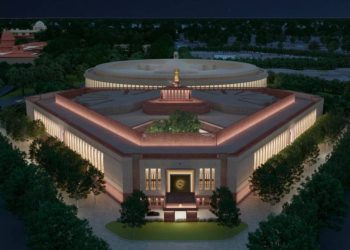This Post Is Recently Updated on Dec 11, 2023 @ 22:20 pm by TBB Desk
The Supreme Court of India today delivered a historic verdict upholding the Union Government’s 2019 decision to amend Article 370 of the Indian Constitution, effectively ending the special status of the erstwhile state of Jammu and Kashmir. The five-judge Constitution bench, led by Chief Justice of India DY Chandrachud, declared the Constitutional order revoking Article 370 as valid, marking a significant moment in the nation’s legal and political history.
The bench, which included Justices S K Kaul, Sanjeev Khanna, B R Gavai, and Surya Kant, had reserved its verdict on 23 petitions challenging the abrogation after 16 days of extensive hearings, which concluded on September 5 this year. CJI DY Chandrachud in his judgment asserted that Jammu and Kashmir held no internal sovereignty following its accession to India and dismissed any claims of bad faith or extraneous exercise of power in the President’s 2019 orders.
Justice Kaul, in his concurring opinion, suggested the establishment of a Truth and Reconciliation Commission in Jammu and Kashmir to address allegations of human rights violations in the region. The court also directed the Centre to restore statehood and hold Legislative Assembly elections, acknowledging the reorganization of the erstwhile state into Union Territories in 2019 as a temporary measure.
Union Home Minister Amit Shah, in response to the verdict, remarked that Article 370 had fostered separatism and promoted terrorism in Jammu and Kashmir. The verdict has sparked various reactions across the political spectrum, with regional leaders expressing disappointment and central leaders hailing it as a step towards full integration of Jammu and Kashmir with India.
This landmark judgment not only reaffirms the government’s stance on Jammu and Kashmir but also sets a precedent for the legal handling of such sensitive constitutional matters in India. The court’s decision is expected to have far-reaching implications on the region’s political and social fabric, as well as on the national discourse surrounding federalism and state autonomy.
Here’s a timeline of key events from the implementation of Article 370 to its abrogation:
- October 17, 1949: Article 370 is included in the Indian Constitution. It grants special autonomy to Jammu and Kashmir, allowing the state to have its own constitution and limiting the Indian Parliament’s legislative powers.
- October 26, 1947: Maharaja Hari Singh signs the Instrument of Accession, leading to Jammu and Kashmir’s accession to India. This document forms the basis of Article 370.
- 1951: Dr. Karan Singh, the crown prince of Jammu and Kashmir, convenes the State’s Constituent Assembly.
- 1952: The Delhi Agreement is signed between Jawaharlal Nehru, then Prime Minister of India, and Sheikh Abdullah, Prime Minister of Jammu and Kashmir. This agreement further defines the relationship between India and Jammu and Kashmir.
- May 15, 1954: Article 35A is introduced via a Presidential Order, providing the Jammu and Kashmir state legislature the power to define ‘permanent residents’ of the state and provide special rights and privileges to them.
- November 17, 1957: The Constitution of Jammu and Kashmir comes into force.
- 1965: The titles of Prime Minister and Sadr-i-Riyasat in Jammu and Kashmir are changed to Chief Minister and Governor, respectively.
- August 5, 2019: The Government of India, led by the BJP, moves to effectively abrogate Article 370. A Presidential Order is issued, making all provisions of the Indian Constitution applicable to Jammu and Kashmir. The Jammu and Kashmir Reorganisation Act 2019 is also passed, bifurcating the state into two Union Territories – Jammu and Kashmir, and Ladakh.
- August 6, 2019: Article 370 is rendered ineffective following a Presidential Order.
- October 31, 2019: The bifurcation of Jammu and Kashmir into two Union Territories comes into effect.
- December 11, 2023: The Supreme Court of India upholds the constitutional validity of the abrogation of Article 370, marking a significant moment in India’s legal and political history.
This timeline covers the major milestones in the history of Article 370, from its inception to its abrogation and the subsequent Supreme Court ruling.










